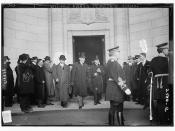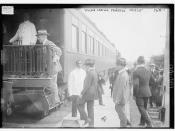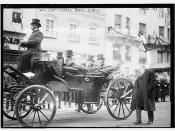N/A N/A,
Lipset's American Creed
Liberty. Egalitarianism. Individualism. Populism. Laissez-faire. These five concepts embody the 'American creed' as described by author Seymour Martin Lipset. Lipset feels that this 'American creed' is representative of an ideology that all Americans share. Lipset's argument is on shaky ground, however, when scrutinized under the microscope of race. Racial relations in this country do much to undermine the validity of Lipset's argument, especially the concepts of egalitarianism and populism.
Take, for example, The Deforming Mirror of Truth, the introduction to a book by Nathan Huggins entitled Black Odyssey: The African-American Ordeal in Slavery. This introduction focuses on how slavery fit into the national consciousness. Without a doubt, there is a powerful abnormality in the founding of America. The documents establishing a country where all men are created equal neglect to address, or even mention by name, those people whose lives were 'merely the extension of the master's will' (Huggins xiv).
Indeed, this suggests that the Founding Fathers had an 'out of sight, out of mind' mentality towards the issue of slavery.
While Huggins understands why the Founding Fathers may have elected to ignore the issue, he hardly thinks that it was a good idea. 'It encouraged the belief that American history-its institutions, its values, its people- was one thing and racial slavery and oppression were a different story' (Huggins xii). He reinforces this idea by looking at the historical perspective that was prevalent in America until only recently. 'American historians, guarding the ideological integrity of the center, have wanted to treat race and slavery as matters apart from the real, central story of American history' (Huggins xvi). Race and slavery. Two concepts that most people would agree are forever linked in America. To assume that blacks and white became equals after the Emancipation Proclamation and...


